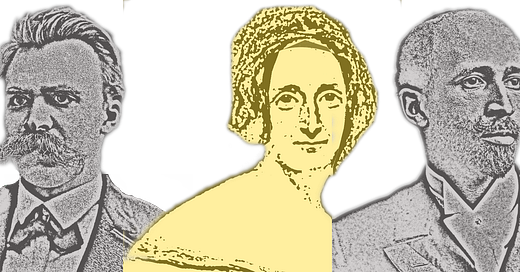No. 23: Techno-optimism, free will, and Scorcese
Baldwin/Du Bois/King/Kierkegaard/Locke/Nietzsche/Schopenhauer
Here's some things other people have been writing:
Locke wrote in his Two Treatises of Government that ownership arose when someone mixed their labor with nature. Though his idea is often portrayed as an inevitable outcome of the pursuit of individualism, in truth his aim was to control the indigent masses. jacobin
Nietzsche is a “Patron Saint of Techno-Optism” says Marc Andreessen, a tech billionaire. Andreessen last week wrote The Techno-Optimist manifesto, a pompous endorsement of runaway capitalism under the guise of technology’s unfaltering advancement. wired
Du Bois, King, and Baldwin understood racism as a manifestation of capitalism. Ibram Kendi is outside that tradition, evangelizing instead personal transformation and top-down control as a means to end racism. His Center for Anti-Racist Research at Boston University has struggled to turn his ideas into action. newyorker
Shelley, Eliot, Fitzgerald, Hemingway, Steinbeck, Huxley, and Orwell all penned final lines that has left readers “disturbed for days”. reddit
Kierkegaard wrote in his journals that “life must be understood backwards”. So it is with the best movies in general, and in particular with Martin Scorcese’s latest film Killers of the Flower of the Moon. vox
Schopenhauer wrote in On the Freedom of the Will that “man can do what he wills but cannot will what he wills.” He’s chiming in on a long discussion on if the universe is deterministic and, if so, how can we have free will? In a new book Kevin Mitchell, a neuroscientist, makes the case that the locus of free will can be situated in the randomness of quantum mechanics. reason




